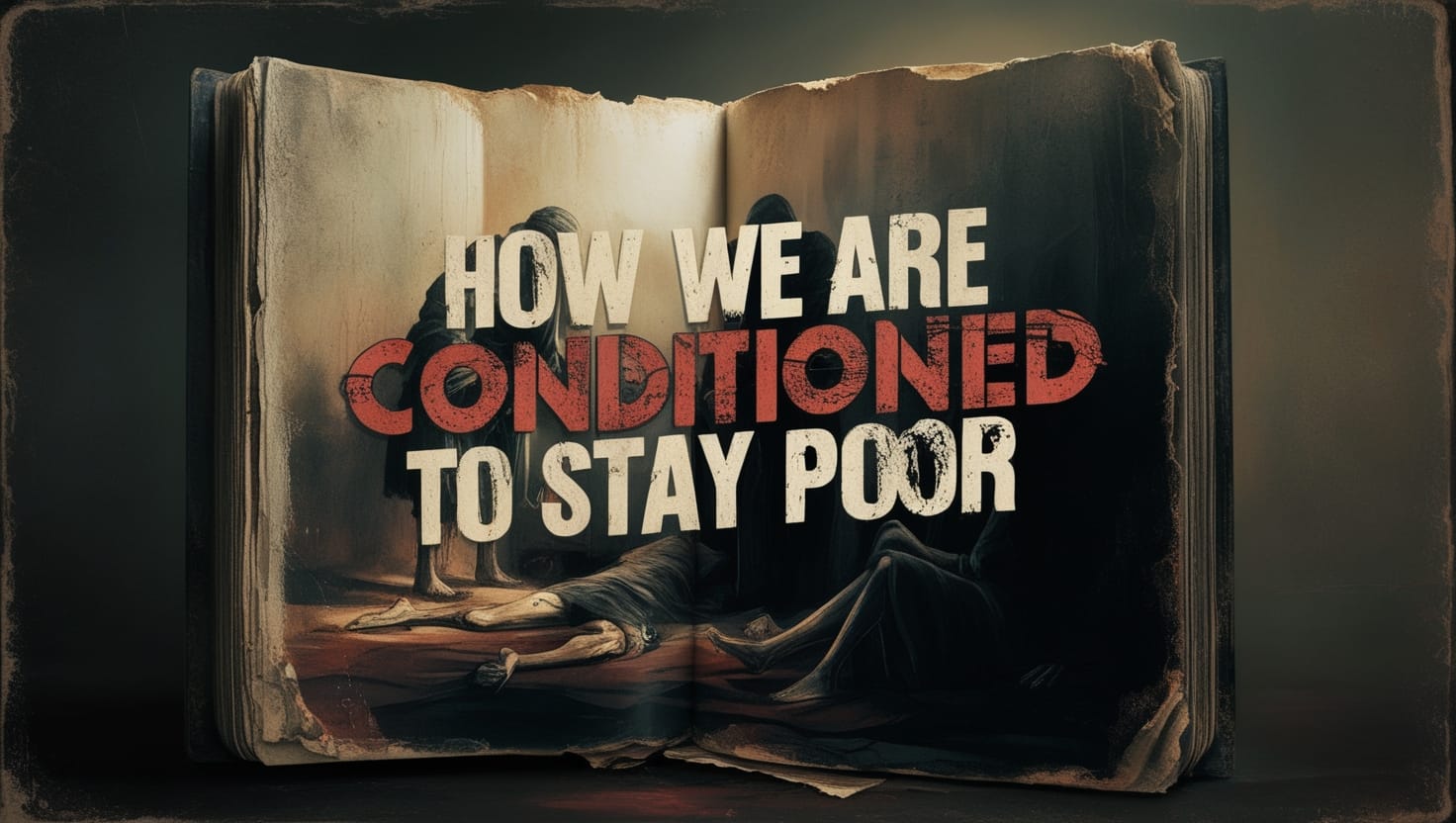Introduction
Poverty is often viewed solely as a lack of financial resources. However, a significant factor contributing to prolonged financial struggle lies in the conditioning and mindsets that society, upbringing, and personal choices impose on individuals. From psychological barriers to societal pressures, various influences create a cycle of financial stagnation. This article explores how certain behaviors, thought patterns, and societal norms condition us to remain poor and, more importantly, how to break free from these constraints.
Not Having Money to Buy
One of the most visible signs of poverty is the inability to buy necessary or desired items. However, this issue often stems from a deeper, systemic cycle:
- Short-Term Thinking: Many people in poverty focus on immediate needs rather than planning for long-term goals. For instance, prioritizing daily expenses over saving for emergencies creates a precarious financial situation.
- Living Paycheck to Paycheck: Without enough disposable income, individuals struggle to build savings or invest in their future. This constant survival mode leaves no room for growth or wealth accumulation.
- Dependence on Credit: The inability to purchase outright leads many to rely on credit, which creates a vicious cycle of debt. High-interest rates on loans or credit cards further exacerbate financial instability.
To overcome this, it is essential to shift from reactive spending to proactive planning. Building even a modest savings habit can provide a foundation for escaping the scarcity mindset.
The Dunning-Kruger Effect
The Dunning-Kruger Effect, a cognitive bias where individuals overestimate their knowledge or skills, plays a significant role in keeping people poor.
- Overconfidence in Financial Decisions: Those affected by this bias may believe they understand personal finance or investment strategies but lack the necessary expertise. This overconfidence often leads to poor choices, such as risky investments or neglecting to save.
- Resistance to Learning: Individuals may assume they already know enough and, as a result, fail to seek out new knowledge or skills that could improve their financial standing.
- Misplaced Trust in Scams: Overestimating their own judgment, people may fall victim to get-rich-quick schemes or unverified financial opportunities.
Addressing the Dunning-Kruger Effect requires a willingness to acknowledge gaps in knowledge and actively seek out education, mentorship, or advice from reputable financial experts.
The FOMO Effect
The Fear of Missing Out (FOMO) is a powerful psychological driver that significantly impacts spending habits.
- Impulse Spending: FOMO often manifests as impulsive purchases to keep up with peers or trends. This could include buying the latest gadgets, luxury items, or vacations, even when finances do not allow it.
- Social Media Pressure: Platforms like Instagram and TikTok amplify the feeling of inadequacy, as users are constantly exposed to curated images of success and luxury.
- Neglecting Investments: FOMO can also deter people from making long-term financial decisions. For example, someone might avoid investing in stocks because they fear missing out on immediate gratification.
Breaking free from the FOMO trap involves cultivating self-awareness and learning to prioritize long-term benefits over short-term pleasures. Practicing mindfulness and creating a budget can help mitigate these tendencies.
Listening to an Inexperienced Entourage
The people we surround ourselves with have a profound influence on our financial choices. Unfortunately, taking advice from an inexperienced entourage often perpetuates poor financial habits.
- Misguided Advice: Friends or family members who lack financial knowledge may offer well-meaning but unhelpful guidance, such as discouraging investments or promoting unnecessary spending.
- Conforming to Group Norms: Many individuals feel pressured to maintain the same financial habits as their peers, even if those habits are detrimental. This could include overspending on social events or avoiding savings because “everyone else is doing it.”
- Reinforcement of Limiting Beliefs: Inexperienced entourages often reinforce limiting beliefs, such as “wealth is only for the lucky” or “money is the root of all evil.” These beliefs can stifle ambition and financial growth.
To counter this influence, seek advice from professionals or individuals with proven financial success. Surrounding yourself with a community that values growth and learning can also inspire positive change.
Having the Wrong State of Mind
Your mindset plays a pivotal role in shaping your financial future. Unfortunately, many people remain poor due to mental barriers and unproductive attitudes, such as:
- Scarcity Mindset: This belief that resources are limited fosters fear and risk aversion. People with a scarcity mindset are less likely to invest, save, or seek opportunities for growth.
- Lack of Self-Worth: Feeling undeserving of wealth or success can lead to self-sabotaging behaviors, such as underpricing your services or avoiding career advancement.
- Fear of Failure: A fear of making mistakes often prevents individuals from taking calculated risks, whether in career moves, investments, or entrepreneurial ventures.
- Procrastination: Delaying important financial decisions, such as budgeting or planning for retirement, can have long-term negative consequences.
Shifting to an abundance mindset—one that views wealth as attainable and expandable—requires conscious effort. Regularly practicing gratitude, setting clear goals, and focusing on personal growth are essential steps in transforming your financial outlook.
Breaking Free from Poverty Conditioning
Breaking the cycle of poverty begins with recognizing these conditioning factors and actively working to overcome them. Here’s how:
1. Educate Yourself
Financial literacy is the cornerstone of escaping poverty. Learn about budgeting, investing, and wealth-building strategies from credible sources.
2. Set Clear Goals
Define specific, measurable financial objectives, such as paying off debt, building an emergency fund, or investing a percentage of your income.
3. Create a Support System
Surround yourself with individuals who encourage growth and share financial wisdom. Joining groups or forums focused on financial education can provide inspiration and accountability.
4. Take Small, Consistent Actions
Even minor changes, such as saving $10 a week or reading a personal finance book, can lead to significant progress over time.
5. Challenge Limiting Beliefs
Replace negative thoughts with empowering beliefs. For instance, instead of thinking, “I’ll never be rich,” tell yourself, “I am capable of building wealth.”
Conclusion
Poverty is not just about a lack of money; it is a complex interplay of psychological, societal, and behavioral factors. From the Dunning-Kruger Effect to the influence of an inexperienced entourage, these forces shape how we think about and interact with money. By identifying and addressing these patterns, anyone can take the first steps toward breaking free from poverty conditioning and building a prosperous future.

